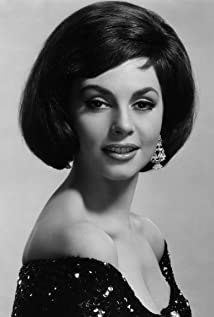Michèle Mercier
For Michèle Mercier, the role of Angélique, "the Marquise of the Angels", was both a blessing and a curse. It catapulted her to almost instant stardom, rivalling Brigitte Bardot in her celebrity and popularity, but ruined her acting career. The character of Angélique made to forget the other aspects of the career of Mercier, but it is true that general public discovered her only in "Angélique", and made her a real star of the French cinema of that time. By the end of the 1960s, the names Angélique and Michèle Mercier were synonymous, and to escape type-casting, Mercier was compelled to leave France and try to re-start her career in United States, unfortunately without any success.
Daughter of Nice's pharmacists, born on January 1st, 1939 and named as Jocelyne Yvonne Renée, she initially wanted to be a dancer. Wartime, no money to buy food, but little Jocelyne wept all week, cadging father, wellknown pharmacist in Nice, to buy her balletskirts and points. In return she promised to work in drug-store. Father took this only as childish whim. But little girl got her wish through: of "small ballet-rat", as they call little dancers, who participate in stageshows, she grew up to soloist in Opera of Nice. Then came Paris. First she was engaged to the troupe of Roland Petit, then she danced in the company of the "Ballets of the Eiffel tower". At 15, she met Maurice Chevalier, who predicted her success and glory. They did arrive, but by another way that the dance. Parallel to her career as dancer, Jocelyne followed courses of dramatic art in the class of Solange Sicard. Her début in French cinema was for Mercier another compromise: her birthname seemed too long and too old-fashioned for movie credits. What, if she'll take a name Michèle? She winced - this was name of her little sister, who died at the age of five by the fever typhoide, but she agreed. And it was also as in testimony of admiration for her partner Michèle Morgan, as she borrowed her name to her. After some romantic comedies and a small role in François Truffaut's "Shoot the pianist" (1960; her favorite role), she approaches the Sixties mainly in the cinema of district. She also worked in England and made then mainly small-budget films in Italy, always in the same register of easy girl. To this moment Michèle already competed with Sophia Loren and Gina Lollobrigida, continuously shooting in Italy. She needed a role, which could make her a star. Only in 1963, when was decided to make movie by sensational novel "Angélique", Michèle got this kind of chance.
Many actresses were approached to play the role of Angélique. The Producer Francis Cosne absolutely wanted Brigitte Bardot for the part. She refused, but later judged Michèle Mercier to be fantastic in it. Annette Stroyberg was considered next, but judged not to be sufficiently well-known. Catherine Deneuve was too pale, Jane Fonda spoke French with an American accent, and Virna Lisi was busy in Hollywood. The most serious actress considered was Marina Vlady. She almost sign a contract, but Michèle Mercier won the role after trying out for it - which she did not appreciate very much since she was being treated like a beginner while she was already a big star in Italy. At the time she was contacted to play Angélique, she had already acted in over twenty movies. During four years she made five Angélique-movies, enjoying the real success. Nevertheless the moment came, when she finally wanted to interrupt with this aggravating character. Michèle played with Jean Gabin in "The Thunder of God" of Denys de la Patellière. Then with Robert Hossein in "La seconde vérité" of Christian-Jaque... But the time has gone. That was also confirmed by Mercier's flop in Hollywood... What life didn't taught her, that's the skill how to dominate men. Every time Michèle captivated regardlessly. She was deceived, betrayed. She suffered. "Men in their way, shattered my life. What I wanted from them? Real, mutual love. What they wanted - no hard to guess," candidly confessed Michèle after sensational story with a shah, who overwhelmed actress with diamonds and bouquets of flowers, and then tryed to rape her. Press enjoyed Michèle's love affairs and divorces. For some reason or other, in real life this beautiful and kind woman met only rascals, without exception. First husband turned out to be alcoholic. With well known racer Claude Bourillot she lived together 12 years. And she was shocked, when in one day she found out that he vanished with her jewels. Full of dramatism was story of her romance with Italian prince N., who after many years of courtship got intimate with Michèle and at the end betrayed her, refusing to marry her. Incidentally, all these failures even more hardened the character of Michèle Mercier. After a very long eclipse, she decided to return to the cinema. In 1998, the actress made in Cuba and in Italy "La Rumbera", a feature film by Italian director Piero Vivarelli. In 1999, swindled of several million francs in a business venture, Mercier had serious financial problems. She even planned to sell famous wedding gown of the Marquise of the Angels. The actress confessed in Nice Matin: "I am ruined, I'll be obliged to sell part of my paintings, my furnitures, my properties, my jewels and the costumes of Angélique". In 2002, she presented at the Cannes Film Festival her second book of memories in which she affirms in the cover that "she's not Angélique!", entrusting her irritation to be summarized to this glamour-image of the Sixties. In this book Mercier also tells about how Italian actor Vittorio Gassman tried to take her by force, but remembers also the gentility of Marcello Mastroianni and the suppers of Bettino Craxi, former Prime Minister, and Silvio Berlusconi. In the end she admits: "All the men who have made the court of me, tried to seduce Angélique... not me. But then one day I understood that Angelique could not make more harm to me, therefore I have learned to consider she's like a little sister, with whom I had to live hand in hand".

